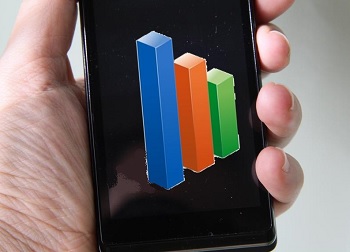Survey highlights the changing behavior of consumers that have become dependent on mobile technology
Deloitte, a leading professional services firm, has released a new survey highlighting mobile consumer behavior. The survey suggests that people in the United States are becoming increasingly obsessed with their mobile devices. Approximately 90% of consumers check their devices within the first hour of being awake and 23% look at their devices up to 50 times throughout the day. This growing dependence on mobile technology is spurring the evolution of commerce, making it more mobile-centric.
Growing awareness of mobile technology is making consumers more comfortable with shopping on their smartphones and tablets
The survey shows that people are becoming more informed about the price of mobile devices and data services offered by major carriers. As such, they are finding better deals and becoming more resistant to marketing campaigns that highlight unattractive service deals. Growing comfort with mobile devices is leading consumers to dabble in mobile commerce and payments. More people are shopping online from their mobile devices, opting to use their smartphones and tablets to purchase products from retailers.
In-store mobile payment support is lacking among retailers, despite strong interest in mobile commerce and mobile shopping
 While consumers are showing interest in using their mobile devices to shop online, the survey shows that in-store mobile payment support is currently lacking. Many retailers are willing to support mobile shopping online, but will not do so in their physical stores. Introducing mobile payment system to physical stores can be a costly venture and some retailers are not yet convinced that mobile commerce is a worthwhile investment.
While consumers are showing interest in using their mobile devices to shop online, the survey shows that in-store mobile payment support is currently lacking. Many retailers are willing to support mobile shopping online, but will not do so in their physical stores. Introducing mobile payment system to physical stores can be a costly venture and some retailers are not yet convinced that mobile commerce is a worthwhile investment.
NFC technology continues to play a major role in the mobile commerce market and NFC-enabled devices are becoming more common
The survey shows that 31% of consumers with NFC-enabled mobile devices have used their device to make a payment in the past month. NFC technology currently makes up much of the backbone upon which mobile commerce is based. NFC-enabled devices have become quite common in the United States and have helped consumers become more involved in the mobile commerce space.
American consumers feel that smartphone based shopping has a greater draw than the in-store experience.
According to the results of recent research that was conducted by Dynatrace – an app performance management firm formerly known as Compuware APM – 37 percent of American smartphone and tablet users see mobile commerce as a more appealing experience than actually going to a store’s physical location in order to make a purchase.
The research also found that many Americans will be choosing m-commerce for their holiday shopping.
In fact, among tablet owners, 42 percent said that they will be doing more of their holiday shopping this year over mobile commerce channels than they did last year at the same time. This makes it look as though this year – which was one that saw a considerable number of milestones in the mobile technology category – has the potential to break some records when it comes to sales over smartphone and tablet optimized websites and retail apps.
Among the respondents 37 percent said that they would do more shopping over mobile commerce than in store.
 They indicated that they will be using m-commerce over smartphones and tablets more often throughout the holiday shopping season than they would be going into physical store locations in order to buy what they want.
They indicated that they will be using m-commerce over smartphones and tablets more often throughout the holiday shopping season than they would be going into physical store locations in order to buy what they want.
The research involved the participation of 1,353 people in the United States who own smartphones and/or tablets. It was conducted by Harris Poll on behalf of Dynatrace in October. It found that even among the consumers who will be going to physical store locations, 25 percent will be making purchases over their mobile devices while standing inside the shops.
According to the Dynatrace director of omnichannel strategy, Erwan Paccard, mobile commerce has “transformed holiday commerce—in fact, retailers are at a tipping point, as they must perform for mobile users or perish at the hands of competitors.” He added that consumers are bringing their smartphones, and even tablets, into stores with them on an increasing basis and are “becoming virtual shopping assistants. And when users encounter poor-performing mobile sites and apps, they buy from competitors and broadcast their frustrations.” He pointed out that retailers that fail to cater to those consumers over the holiday season “do so at their own peril.”
 While consumers are showing interest in using their mobile devices to shop online, the survey shows that in-store mobile payment support is currently lacking. Many retailers are willing to support mobile shopping online, but will not do so in their physical stores. Introducing mobile payment system to physical stores can be a costly venture and some retailers are not yet convinced that mobile commerce is a worthwhile investment.
While consumers are showing interest in using their mobile devices to shop online, the survey shows that in-store mobile payment support is currently lacking. Many retailers are willing to support mobile shopping online, but will not do so in their physical stores. Introducing mobile payment system to physical stores can be a costly venture and some retailers are not yet convinced that mobile commerce is a worthwhile investment.
 They indicated that they will be using m-commerce over smartphones and tablets more often throughout the holiday shopping season than they would be going into physical store locations in order to buy what they want.
They indicated that they will be using m-commerce over smartphones and tablets more often throughout the holiday shopping season than they would be going into physical store locations in order to buy what they want.